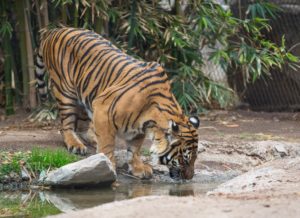Eyes on the front, ready to hunt!

Did you know animals that hunt are called predators?
Predators eat other animals, called prey, for food. They are very important for keeping ecosystems healthy because they maintain the balance between plants and the animals that eat plants (herbivores). When predators are removed from an ecosystem, there are too many herbivores and not enough food to go around.
There are a lot of predators in the world, and at Reid Park Zoo you can learn about some of the biggest predators out there: lions, jaguars, and tigers. As big as they are though, these predators need our help. On July 29, we will be celebrating International Tiger Day.
You can celebrate too by learning more about the Malayan tigers at Reid Park Zoo and what you can do to help protect them. Here’s some information to get you started:
- Tigers are found on the continent of Asia, in grassy or forested habitats.
- There are 6 species (types) of tigers – Amur, Bengal, Malayan, Sumatran, Indochinese, and South China.
- Tigers have vertical stripes to help them blend in with grass and trees. Like human fingerprints, no two tiger stripe patterns are the same.
- Tigers usually give birth to 2-4 cubs per litter.
- Tigers can run up to 40 miles per hour (but only for short distances).
- Unlike many other cats, tigers like water and are excellent swimmers.
- In the wild, tigers prefer to eat hoofed mammals such as deer. They may also eat smaller animals like fish and turtles.
- Tigers are endangered in the wild because of habitat loss and illegal hunting (poaching).
- Scientists believe that there are fewer than 500 Malayan tigers in the wild.
- Zoos work together to find ways to help protect tigers in the wild and to educate people about the importance of protecting tigers in their natural habitat.

Although tigers live in Asia, there is a way we can protect them right here in Tucson. When shopping, you can help your family buy products that will not cause harm to the tiger habitat. Currently, many products we use every day are made with palm oil such as food, cosmetics, shampoos, and soaps. In order to grow the trees used to produce palm oil, tiger habitat is cut down and turned into farms.
By choosing products that do not include palm oil or are made from palm oil that is grown in a way that protects wildlife habitats, you can help protect tigers. You can easily detect which products are tiger-friendly by asking your parents to download the Sustainable Palm Oil Shopping Guide, created by Cheyenne Mountain Zoo, onto their phones. Then while shopping, you can use their phone to scan the items your family is buying to check the items in your cart. It is an easy (and FUN!) way that we can protect tigers and other wildlife around the world!
Download the Sustainable Palm Oil Shopping Guide (iPhone)
Download the Sustainable Palm Oil Shopping Guide (Android)
